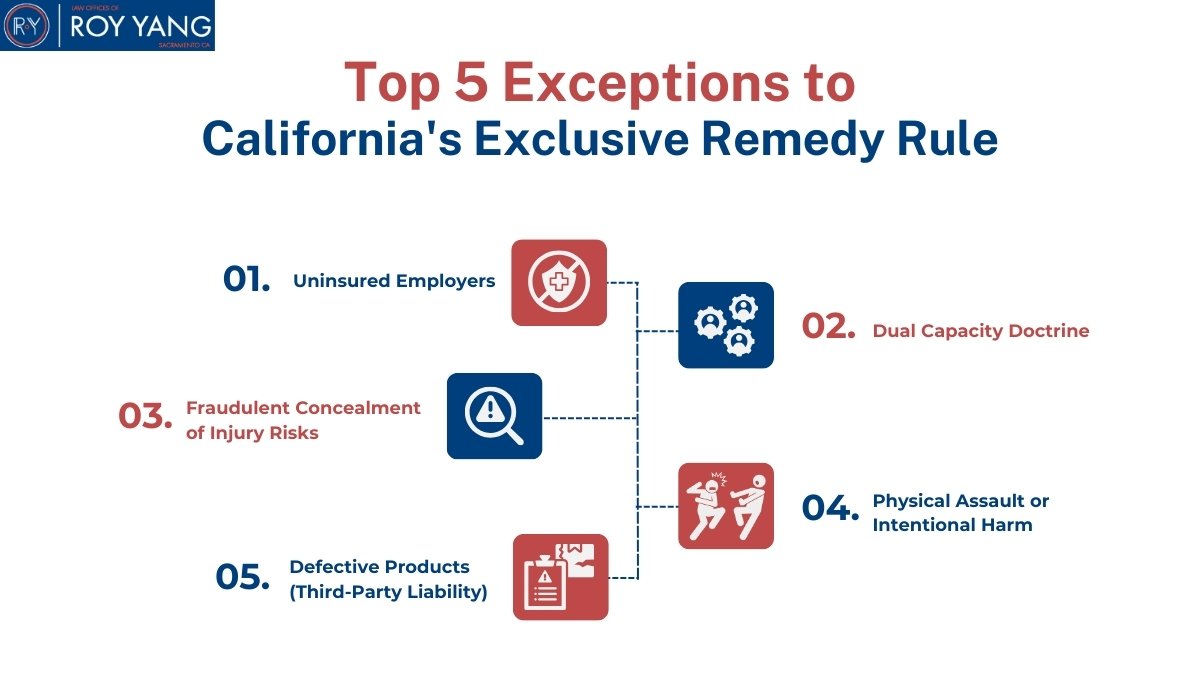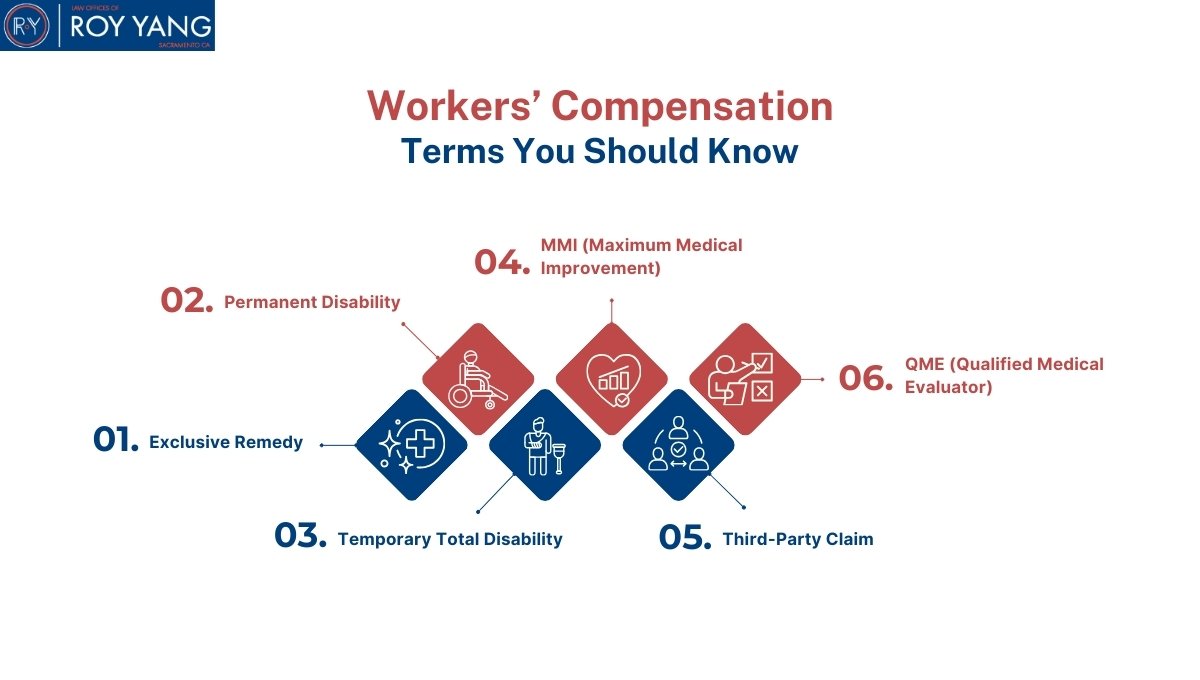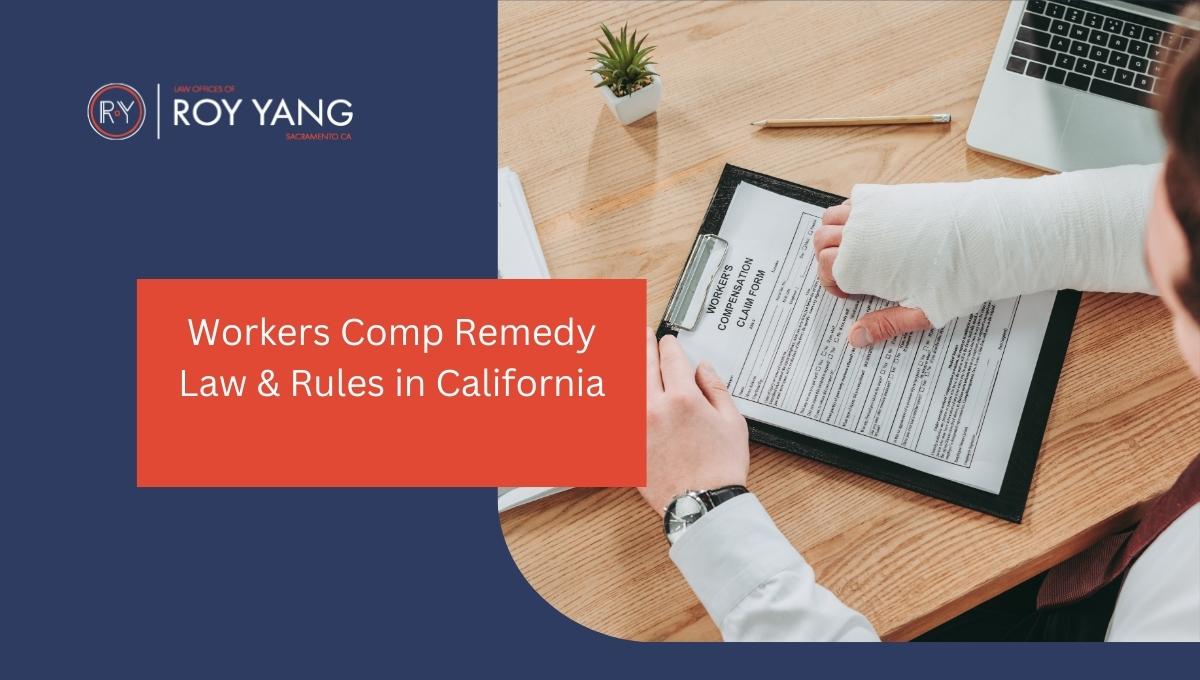The Workers Comp Remedy law, also known as the exclusive remedy rule, says if you’re injured on the job, your right to compensation comes through the workers’ compensation system, not through a lawsuit.
This rule is designed to protect both workers and employers: You get access to medical care and lost wages without needing to prove fault, and your employer is protected from being sued, except in specific situations.
But here’s what most workers in Sacramento and across California don’t realize: There are important exceptions to this rule, and if your case qualifies, you can take legal action beyond workers’ comp.
If you’re unsure whether your case is covered under this rule or qualifies for an exception, don’t wait — talk to a California workers’ compensation lawyer who can help you understand your rights and fight for everything you’re entitled to.
Key Takeaways
- Workers’ comp is your primary legal remedy for job-related injuries in California.
- Benefits cover medical care, lost wages, disability, retraining, and death, but not pain or suffering.
- You can sue outside workers’ comp only in cases of employer misconduct, no insurance, or third-party fault.
- Employer retaliation for claims is illegal and can lead to penalties.
- Claims must be reported within 30 days and filed within one year.
- Legal help is vital for denied claims, exceptions, or complex cases.
What Are the Benefits Provided Under the Exclusive Remedy Law?
When you’re injured on the job in California, the exclusive remedy law guarantees specific workers’ comp benefits through the workers’ compensation system without the need to sue your employer or prove fault.
Here’s what’s typically covered:
- Medical Treatment and Rehabilitation
All reasonable and necessary medical care related to your work injury including doctor visits, surgery, physical therapy, medication, and ongoing rehabilitation is fully covered. - Temporary and Permanent Disability Benefits
If you can’t work while recovering, you may receive temporary disability payments (partial wage replacement). If your injury causes long-term impairment, you may qualify for permanent disability benefits, even if you return to some form of work. - Vocational Retraining and Return-to-Work Support
If you’re unable to return to your previous job, California offers support for job retraining or skill enhancement to help you re-enter the workforce in a new role. - Death Benefits and Funeral Costs
If a work-related injury results in death, surviving dependents may receive death benefits, and the employer must cover reasonable funeral and burial expenses.
What’s Not Covered
Workers’ compensation does not provide compensation for:
- Pain and suffering
- Emotional distress
- Punitive damages
These types of damages are only available in personal injury lawsuits, which are not allowed under the exclusive remedy rule unless your case qualifies for an exception.
When Is Workers’ Comp Your Only Legal Option?
Workers’ compensation is your only legal option when your injury happens on the job and your employer has valid workers’ comp insurance. This is known as the exclusive remedy rule and it applies in most routine workplace injury cases.
You cannot sue your employer if:
- The injury occurred during your normal job duties
- There was no intentional harm or gross misconduct
A third party wasn’t involved - Your employer carried valid workers’ comp insurance
For example, if you strain your back lifting a box, slip and fall at work, or develop carpal tunnel from repetitive tasks, you’re covered under workers’ comp, and you can’t file a civil lawsuit, even if your employer was careless.
Instead, you’ll receive benefits like medical treatment, wage replacement, and disability support through the workers’ compensation system. However, you won’t be able to claim pain and suffering or emotional damages, which are only available in rare exception cases.
Understanding when workers’ comp is your only remedy helps set the right expectations and ensures you take the proper steps from day one.
Top 5 Exceptions to California's Exclusive Remedy Rule
The workers’ compensation remedy law in California blocks most lawsuits against employers. But in five specific situations, you may still have the right to sue your employer directly.
These exceptions are often misunderstood. Knowing when they apply is critical because if your case qualifies, it opens the door to civil damages beyond workers’ comp. We help you evaluate these paths when workers’ comp doesn’t go far enough.
1: Uninsured Employers
If your employer doesn’t carry workers’ compensation insurance, they lose their legal protection under the exclusive remedy rule. In these cases, you can sue them directly for your injuries.
California law requires every employer to provide workers’ comp coverage. When they fail to do so, you gain the right to file a civil lawsuit, which can include pain and suffering and other damages not available through workers’ comp.
2: Dual Capacity Doctrine
An employer who plays more than one legal role may lose protection under the exclusive remedy rule. This is known as the dual capacity doctrine.
For example, if your employer also manufactured the equipment that caused your injury, they’re not just your boss – they’re also a product manufacturer. In this case, you can sue them under product liability laws.
3: Fraudulent Concealment of Injury Risks
If your employer knew about a workplace danger but intentionally hid it, you can sue for the harm caused. This exception is called fraudulent concealment.
For instance, if your employer failed to warn you about toxic chemical exposure, and you later develop a serious condition, you’re entitled to pursue a civil claim. Workers’ comp does not protect employers who deliberately put workers at risk.
4: Physical Assault or Intentional Harm
When an employer intentionally hurts an employee, workers’ comp protection no longer applies. You have the right to sue them directly for damages.
This includes cases where an owner, manager, or supervisor physically assaults you or causes deliberate emotional distress.
5: Defective Products (Third-Party Liability)
If a defective product or machine causes your injury, you may be able to sue the manufacturer or your employer if they built or maintained the product. This triggers an exception based on third-party liability or, in some cases, the dual capacity doctrine.
For example, if a faulty forklift crushes your foot, and it was made by another company, you pursue a civil claim against the manufacturer. If your employer designed or sold the forklift, you build a case around their secondary legal role.
These third-party lawsuits can provide higher compensation than standard workers’ comp claims. We make sure every responsible party is held accountable.

When Can You Sue Outside of Workers’ Comp?
Lawsuits outside the workers’ comp system are only allowed in limited cases. You may have a claim if:
- Your employer intentionally harmed you
- They don’t have workers’ comp insurance
- They concealed known risks
- A third party caused your injury
We outline these exceptions clearly in our guide on suing outside of workers’ compensation.
How to File a Workers’ Compensation Claim in California?
Filing a workers’ compensation claim in California starts with one simple step: report your injury to your employer as soon as possible. Legally, you must notify them within 30 days of the incident. After that, your employer should provide you with a DWC-1 claim form, which you’ll need to complete and return. This form officially starts your claim.
Once submitted, your employer’s insurance company will review your case and decide whether to approve benefits. During this time, it’s critical to document everything: medical records, witness names, and any communication with your employer. The sooner you act and the more complete your paperwork, the smoother the process will be.
Common Reasons Claims Get Denied (And What You Can Do)
Workers’ comp claims can get denied for several reasons, even valid ones. Some of the most common include missing the deadline, incomplete forms, lack of medical evidence, or your employer disputing the injury.
If your claim is denied, don’t panic. You have the right to appeal. This usually involves requesting a hearing with the California Workers’ Compensation Appeals Board and possibly getting evaluated by a Qualified Medical Evaluator (QME). Having an experienced attorney by your side during this process can make a huge difference in turning a denial into an approval.
What If My Employer Retaliates?
Filing a workers’ compensation claim is your legal right, and your employer is not allowed to punish you for using it. If your employer fires you, cuts your hours, demotes you, or treats you unfairly after you file a claim, that’s called retaliation, and it’s against the law in California.
Retaliation can be obvious, like termination, or subtle, like being excluded from meetings or getting reassigned to a less favorable role. No matter how it shows up, it’s important to document everything; emails, texts, changes in job duties — and speak to a workers’ comp attorney right away.
Under California Labor Code §132a, you may be entitled to reinstatement, lost wages, and financial penalties against your employer if retaliation is proven. You don’t have to face this alone, legal support can help protect your job, your rights, and your peace of mind.
When Do You Need a Workers’ Compensation Lawyer?
Not every workers’ comp claim requires an attorney, but some situations call for legal help fast. If your claim was denied, delayed, or you’re being pressured to settle for less, it’s time to speak with a workers’ compensation lawyer. The same goes if your injury is serious, your benefits don’t cover your needs, or your employer is acting unfairly or retaliating.
You also need legal support if your case involves complex issues, like a third-party lawsuit, long-term disability, or one of the exceptions to California’s exclusive remedy rule. A good lawyer can help maximize your benefits, handle the paperwork, and represent you in front of the Workers’ Compensation Appeals Board if needed.
When the system isn’t working in your favor, a workers’ comp attorney can make sure your rights are protected and that you get everything you’re entitled to.
Key Workers’ Compensation Terms You Should Know
Understanding workers’ comp language can make the entire process less confusing. Here are some of the most important terms you’ll come across in a California workers’ compensation case:
Exclusive Remedy
This means workers’ compensation is your only legal option for recovering benefits after a workplace injury. You generally cannot sue your employer, except in certain rare situations.
Permanent Disability
A long-term or lasting injury that affects your ability to work. If your doctor determines you won’t fully recover, you may receive permanent disability payments, even if you can still do some kind of work.
Temporary Total Disability
This is compensation you receive when your injury temporarily prevents you from working at all. You’ll typically receive a portion of your lost wages while you recover.
MMI (Maximum Medical Improvement)
This is the point where your condition has stabilized and is not expected to improve further. Once you reach MMI, your doctor can assess whether you have any permanent disability.
Third-Party Claim
If someone other than your employer caused your injury, like a driver, equipment manufacturer, or outside contractor, you may be able to file a separate personal injury lawsuit against them.
QME (Qualified Medical Evaluator)
A QME is a state-certified doctor who evaluates you when there’s a dispute about your condition, such as how serious your injury is or whether it’s work-related. Their report plays a key role in your case.

How California’s Workers’ Compensation Laws Differ From Other States?
California’s workers’ compensation laws have some unique features that set them apart from other states, and if you’re injured here, it’s important to understand how the system works specifically in California.
Unlike some states, California requires nearly all employers to carry workers’ comp insurance, regardless of company size or number of employees. California also offers broader protections, covering many part-time and undocumented workers, and it provides access to both medical care and wage replacement.
Another key difference is the strict deadlines and procedures California uses. For example, you must report your injury within 30 days and file a claim within one year to remain eligible for benefits. These timelines are strictly enforced, and missing them can put your entire claim at risk.
If you’re injured on the job in California, don’t assume the rules are the same as in other states. To protect your rights and get the benefits you deserve, it’s critical to follow California-specific laws and procedures from the very beginning.
How a Workers’ Comp Lawyer Can Help You Navigate Complex Cases?
While some straightforward claims can be handled alone, many workers’ comp cases in California become complicated fast, and having a lawyer on your side can make all the difference.
A workers’ comp lawyer can:
- Explain your legal rights clearly so you understand what you’re entitled to under California law.
- Handle paperwork and deadlines to ensure your claim is filed properly and on time.
- Deal with insurance companies that delay, deny, or underpay your benefits.
- Challenge low disability ratings or unfair medical evaluations that affect your compensation.
- Represent you at hearings and appeals before the Workers’ Compensation Appeals Board (WCAB).
- Investigate complex situations, including third-party liability or employer misconduct.
- Protect you from employer retaliation and help you file additional claims if necessary.
- Pursue additional compensation when your case qualifies for an exception to the exclusive remedy rule.
- Guide you through every step so you’re not navigating the system alone.
Free Case Evaluation – Talk to a California Workers' Comp Attorney
If you’ve been injured at work, the smartest first step you can take is to talk to an experienced California workers’ compensation attorney, and the consultation is absolutely free.
During your case evaluation, you’ll get honest answers about your rights, your benefits, and whether your situation qualifies for an exception to the exclusive remedy rule. A skilled lawyer will review the details of your injury, explain what to expect, and help you avoid costly mistakes, all with no pressure to commit.
Whether your claim was denied, delayed, or you just want to understand your options, this no-obligation consultation is a risk-free way to protect your future.
Don’t wait. Your time to file is limited, and your peace of mind starts with a conversation.



